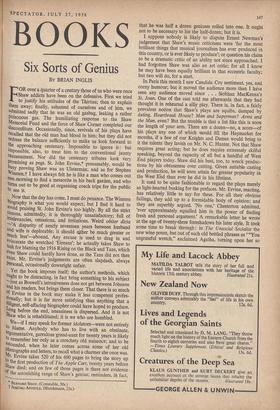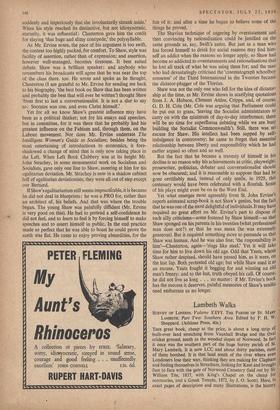BOOKS
Six Sorts of Genius
BY BRIAN INGLIS FOR over a quarter of a century those of us who were once Shaw addicts have been on the defensive. First we tried to justify his attitudes of the Thirties; then to explain them away; finally, ashamed of ourselves and of him, we admitted sadly that he was an old gasbag, leaking a rather Poisonous gas. The humiliating response to the Shaw Memorial Fund and the farce of Shaw Corner completed our discomfiture. Occasionally, since, revivals of his plays have recalled that the old man had blood in him; but they did not redress the balance sufficiently to make us look forward to the approaching centenary. Impossible to ignore it : but impossible, also, to treat him to the conventional jaunty reassessment. Nor did the centenary tributes look very Promising as pegs. St. John Ervine,* presumably, would be busy proving Shaw was an Ulsterman; and as for Stephen Winsten,t I have always felt he is like a man who comes out one morning to find a meteorite in his back garden, and who tunis out to be good at organising coach trips for the public to see it.
. Now that the day has come, I must do penance. The Winsten biography is what you would expect; but I find it hard to avoid praising St. John Ervine's too highly. By all the strict • Fanons, admittedly, it is thoroughly unsatisfactory; full of Irrelevancies, omissions, and irritations. Weird obiter dicta ---`A disparity of nearly seventeen years between husband and wife is deplorable; it should either be much greater or Much less'—abound. Any excuse is used to drag in and eviscerate the wretched `Eireans'; he actually takes Shaw to task for blaming the 1916 Rising on the Black and Tans, which even Shaw could hardly have done, as the Tans did not then exist. Mr. Ervine's judgements are often slapdash, always Personal, occasionally downright unfair.
Yet the book imposes itself; the author's methods, which ought to be distracting, in fact bring something to his subject 'just as Boswell's intrusiveness does not get between Johnson and his readers, but brings them closer. That there is so much Of Ervine in the book may make it less competent profes- 81onally; but it is far more satisfying than anything that a diligent, self-affacing biographer could have hoped to produce. Long before the end, uneasiness is dispersed. And it is not Shaw who is rehabilitated; it is we who are humbled.
We—if I may speak for former idolators—were not entirely to blame. Anybody who has to live with an obstinate, argumentative, garrulous grand-aunt for twenty years is likely to remember her only as a crotchety old nuisance; and to be astounded, when he later comes across some of her old Photographs and letters, to recall what a charmer she once was. Mr. Ervine takes 520 of his 600 pages to bring the story up to the first production of The Apple Cart, twenty years before Shaw died; and on few of those pages is there not evidence of the astonishing range of Shaw's genius; reminders, in fact, *BERNARD SHAW. (Constable, 50s.) t JESTING APOSTLE. (Hutchinson, 21s.) that he was half a dozen geniuses rolled into one. It ought not to be necessary to list the half-dozen; but it is.
I sgppose nobody is likely to dispute Ernest Newman's judgement that Shaw's music criticisms were 'far the most brilliant things that musical journalism has ever produced in this country, or is ever likely to produce': or question his claim to be a dramatic critic of an ability not since approached. I had forgotten Shaw was also an art critic; for all I know he may have been equally brilliant in that eccentric faculty; but two will do, for a start.
In Paris this month I saw Candida. Coy sentiment, yes. and corny humour; but it moved the audience more than I have seen any audience moved since . . . Siobhan MacKenna's St. Joan. One of the cast told me afterwards that they had thought it in rehearsal a silly play. There is, in fact, a fairly prevalent notion that Shaw's plays are squibs, damped by dating. Heartbreak House? Man and Superman? Arms and the Man, even? But the trouble is that a list like this is soon the length of your arm. There are a dozen—no, a score—of his plays any one of which would fill the Haymarket for months, if a few of our Knights and Dames would bring to it the talents they lavish on Mr. N. C. Hunter. Not that Shaw requires great acting; but he does require extremely skilful speaking, beyond the capacity of all but a handful of West End players today. Shaw did his best, too, to wreck produc- tions by his obtuseness over cutting. Given suitable casting and production, he will soon attain far greater popularity in the West End than ever he did in his lifetime.
It used to be quite fashionable to regard the plays merely as light-hearted busking for the prefaces. Mr. Ervine, reacting, has relatively little to say for these. For all their obvious failings, they add up to a formidable body of opinion; and they are superbly argued. 'No one,' Chesterton admitted, 'ever approximately equalled him in the power of finding fresh and personal argument.' A remarkable letter he wrote at the age of twenty-three foreshadows his later style. It took some time to break through: in The Unsocial Socialist the new wine pours, but out of such old bottled phrases as "You ungrateful wretch," exclaimed Agatha, turning upon her so suddenly and imperiously that she involuntarily shrank aside.' When his style reached its distinctive, but not idiosyncratic, maturity, it was influential : Chesterton gave him the credit for slaying 'that huge and slimy centipede,' the polysyllable.
As Mr. Ervine notes, the pace of his argument is too swift, the content too highly packed, for comfort. To Shaw, style was facility of assertion, rather than of expression; and assertion, however well-managed, becomes tiresome. It best suited debate. Shaw was a brilliant speaker: and anybody who remembers his broadcasts will agree that he was near the top of the class there, too. He wrote and spoke as he thought; Chesterton (I am grateful to Mr. Ervine for sending me back to his biography, 'the best book on Shaw that has been written and probably the best that will ever be written') thought Shaw 'from first to last a conversationalist. It is not a slur to say so: Socrates was one, and even Christ himself.'
Yet for all we know Shaw's greatest influence may have been as a political thinker; not for his essays and speeches, but in committee, for it was there that he probably had his greatest influence on the Fabians and, through them, on the Labour movement. Nor does Mr. Ervine underrate The Intelligent Woman's Guide to Socialism: besides being the most entertaining of introductions to economics, it fore- shadowed a change of mind that is only now taking place in the Left. When Left Book Clubbery was at its height Mr. John Strachey, in some monumental work on Socialism and Socialists, gave only one line to Shaw, sneering at him for his egalitarian deviation. Mr. Strachey is now in a shadow cabinet full of egalitarian deviationists; they were all out of step except our Bernard.
If Shaw's egalitarianism still seems impracdcable, it is because he did not deal in blueprints: he was a PRO for, rather than an architect of, his beliefs. And that was where the trouble began. The young Shaw was painfully diffident (Mr. Ervine is very good on this). He had to pretend a self-confidence he did not feel, and to learn to feel it by forcing himself to make speeches and to assert himself in public. In the end practice made so perfect that he was able to boast he could prove the earth was flat. He came to enjoy proving absurdities, for the The Shavian technique of angering by overstatement and then convincing by rationalisation could be justified on the same grounds as, say, Swift's satire. But just as a man who has forced himself to drink for social reasons may find him- self an addict when the reasons no longer apply, so Shaw had become so addicted to overstatements and rationalisations that he lost all traek of what he was using them for; and the man who had devastatingly criticised the 'cinematograph schoolboy nonsense' of the Third International in the Twenties became the dictator-plugger of the Thirties.
Shaw was not the only one who fell for the idea of dictator- ship at the time, as Mr. Ervine shows in scarifying quotations from J. A. Hobson, Clement Attlee, Cripps, and, of course. G. D. H. Cole (Mr. Cole was arguing that Parliament could be put out to grass, 'leaving the Socialist administrators to carry on with the minimum of day-to-day interference; there will be no time for superfluous debating while we are busy building the Socialist Commonwealth). Still, there was no excuse for Shaw. His intellect had been sapped by self- indulgence in controversy; he came to forget that essential relationship between liberty and responsibility which he had earlier argued so often and so well. But the fact that he became a travesty of himself in his decline is no reason why his achievements as critic, playwright. prosewriter, politician, debater and conversationalist should now be obscured; and it is reasonable to suppose that had he gone certifiably mad, instead of only senile, in 1929, this centenary would have been celebrated with a flourish. Some of his plays might even be on in the West End. Yet what emerges most agreeably from St. John Ervine's superb animated scrap-book is not Shaw's genius, but the fact that he was one of the most delightful of individuals. It may have required no great effort on Mr. Ervine's part to dispose of such silly criticisms—some fostered by Shaw himself—as that Shaw sponged on his parents in his twenties (what professional man does not?) or that he was mean (he was extremely generous). But it required something more to persuade us that Shaw was human. And he was also fine; 'the responsibility in him'—Chesterton, again—`rings like steel.' Yet it will take time for him to live down his old age. Odd that Yeats, whom Shaw rather despised, should have passed him, as it were, cal the last lap. Both protested old age; but while Shaw used it as an excuse, Yeats fought it begging for and winning an old man's frenzy; and to the last, truth obeyed his call. Of course, he did not live as long . . . no matter: if Mr. Ervine's book has the success it deserves, painful memories of Shaw's senilia need embarrass us no longer.



































 Previous page
Previous page